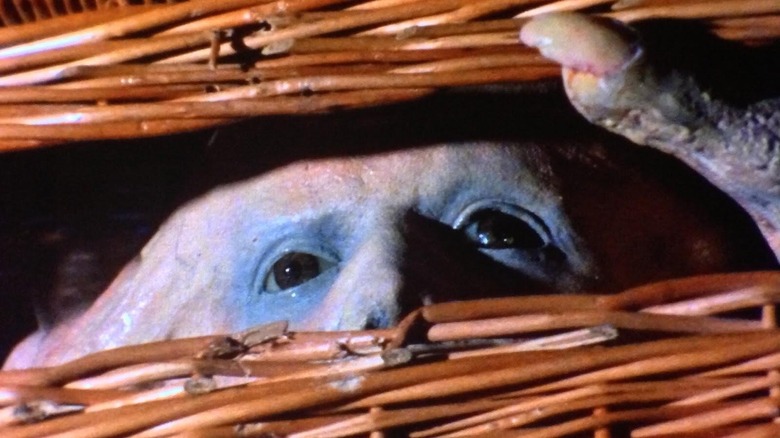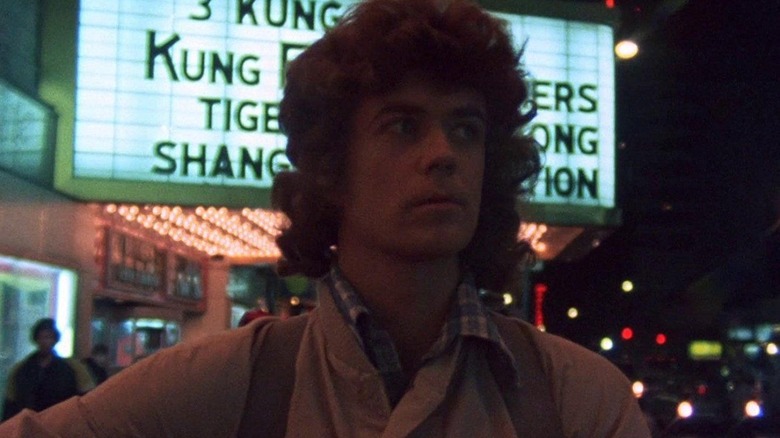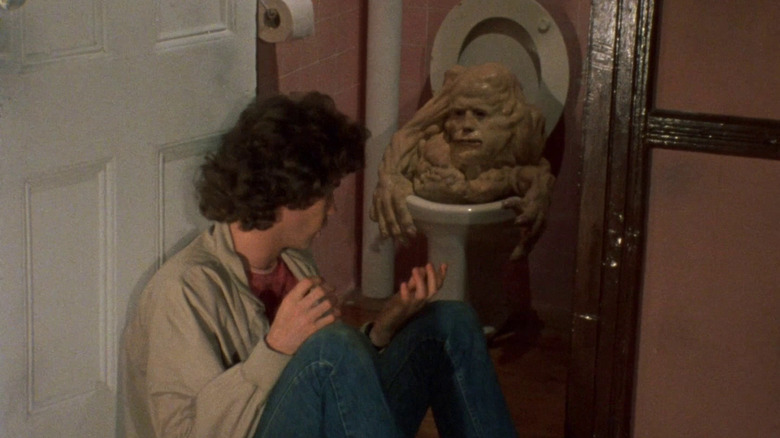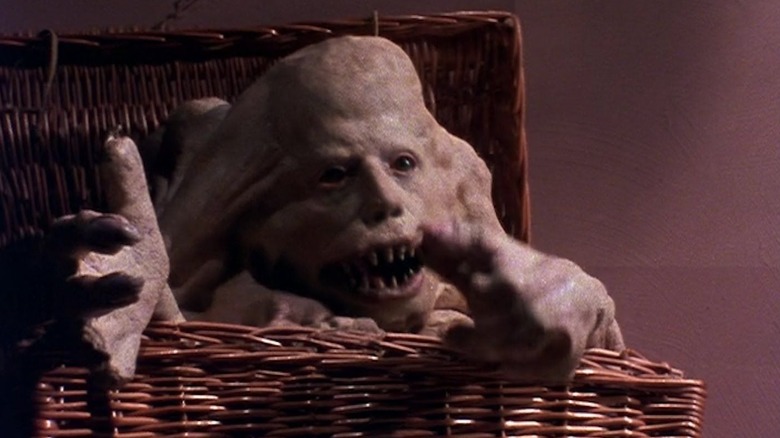The Daily Stream: Bite Into The Twisted, Street-Level Terror Of Basket Case
(Welcome to The Daily Stream, an ongoing series in which the /Film team shares what they've been watching, why it's worth checking out, and where you can stream it.)
The Movie: "Basket Case"
Where You Can Stream It: The Criterion Channel, Tubi, Kanopy, Screambox, Arrow
The Pitch: Backed by a grant from the National Endowment for the Arts, a group of scattered New York artists gathered in a room sometime in 1974 to talk. Their goal was to assemble a loosely organized art collective that would remain in artistic control of its own exhibitions and its own cable TV station. The resulting collective was called Collaborative Projects, or Colab for short. Colab proceeded to put on public variety performances with names like "Income and Wealth Show," "The Batman Show," and "Just Another A**hole Show." The Colab also sponsored a series of feature films that came to be known as the No Wave movement. These were films that were shot guerilla style, usually had no budget, and were raw in their message and aesthetic. Many notable films and filmmakers came from the No Wave movement, including Jim Jarmusch, Susan Seidelman, Nick Zedd, Abel Ferrara, and Lizzie Borden. This was the generation that Warhol begat, the siblings of John Waters, the second cousins of George Kuchar.
Not quite part of the movement, but definitely swimming in No Wave pools was Frank Henenlotter, child of New York and exploitation filmmaker extraordinaire. In 1982, Henenlotter, raised in New York's grindhouse theaters and inspired by the monster movies of his youth, put together his first feature, "Basket Case."
Dear friends, "Basket Case" is spectacular.
Why it's essential viewing
The first thing one might notice about "Basket Case" is its authentic grit. Shot on 16mm film, No Wave style, and operating on a budget of only $35,000, "Basket Case" spends a lot of time prowling around the streets of 1980s New York, peering deep into the litter and the crowds, looking for the monsters that lurk therein.
"Basket Case" stars Kevin Van Hentenryck as Duane, a mild-mannered fellow who most certainly has violence somewhere in his heart. Duane arrives in New York, checks into a cheap, sleazy motel, and sets up shop, all while carrying a mysteriously large, locked wicker basket. In private, he opens the basket and throws in a few hamburgers. He talks to the basket. It doesn't respond. Living inside the basket is none other than Belial, Duane's twin brother. Belial cannot speak and is little more than a mound of flesh with an enormous fanged mouth, black eyes, sharp teeth, and two powerful, monstrous arms. The two brothers communicate telepathically.
In flashbacks throughout the film, the audience learns Duane and Belial's story. As boys, they were conjoined, with Belial emerging from under Duane's arm. Despite their protests, Duane and Belial were ordered to be surgically separated. Belial has been full of hate ever since, resenting having been removed. Duane, meanwhile, hates the world for how badly it treated his brother. At Belial's instigation, they are in New York to murder the doctors who separated them all those years ago.
Along the way, Duane finds himself falling for Sharon (Terri Susan Smith), one of the doctor's assistants, while Belial remains hellbent on violence. The brothers find their paths diverging.
He ain't heavy...
"Basket Case" functions perfectly well as a grimy exploitation movie and a great one at that. Henenlotter, an open fan of cinema's greatest gorehound Herschell Gordon Lewis, understands what grindhouse audiences want to see, and infuses his violence and monsters with a near-cartoonish verve. That same cartoonish verve will be expanded by a factor of a hundred in 1990's "Basket Case 2," a film that approaches perfection. Henenlotter knows what's fun, what's gross, and when to let his monsters breathe. The visual effects for Belial were achieved through a combination of puppetry, masks, and models, and Henenlotter knows that we need to see it. There is little in the way of classic monster movie obfuscation, a trope that dictates monsters be kept largely hidden. Belial is out in the open a lot. We love to see it (even if Belial's actual center of gravity seems to fluctuate).
But additionally, "Basket Case," through its street-level verisimilitude and curious grindhouse earnestness, invites analysis. One can, of course, see a psychological study at play, with Duane operating as a Freudian ego and Belial as the id. Their relationship is truly brotherly in that they clearly care about each other but don't always like each other. One is more sexual, more bloody than the other gentler, more loving character. Duane is the Apollonian mind while Belial is the Dionysian body.
In his book "Horror Films of the 1980s," author John Kenneth Muir even posited that "Basket Case" is a film expressly about abortion. Henenlotter was certainly tapping into a fraught image when he filmed the bloody, separated, still-living Belial in a garbage bag. Whether or not the film is ultimately pro- or anti-choice is a matter of debate.
The sweetness
But the reason "Basket Case" persists might be a strange streak of underlying humanity. Beneath the goofy special effects and bloody violence is a strangely believable movie about human beings attempting to relate. The film's No Wave inflection may be undercutting any sense of cinematic artificiality, leading viewers to see the naturalistic, ecstatic truth of a scene. Those are real streets, that's a real dingy hotel, those are real people. Well, and a monster puppet. There can be more honesty in a bunch of amateurs being fake-slaughtered than in the most heartfelt of Hollywood dramas. In fact, forget I brought up Hollywood dramas. F*** Hollywood. This is New York, baby.
"Basket Case" was relatively well-received upon its release, and has grown into a cult classic of high renown. A few years back, the Museum of Modern Art restored "Basket Case," remixing its magnetic audio, and upgrading its 16mm images to a 4K digital print. It looks better now than when it was first printed. It's also available on the Criterion Channel, and one might be hard-pressed to name many films that are readily available on both Criterion and Tubi.
Frank Henenlotter would continue to make strange, monster-filled, sex-obsessed exploitation movies every few years since. In 1988, he made "Brain Damage," about a man who finds a friendly talking alien eel feeding off his brain. In 1990, he made both "Basket Case 2" and the glorious "Frankenhooker," which is about exactly what you think it is. His last narrative feature came in 2008 with "Bad Biology," a film about ... well, look it up.
But start with "Basket Case." Witness the wonder.



